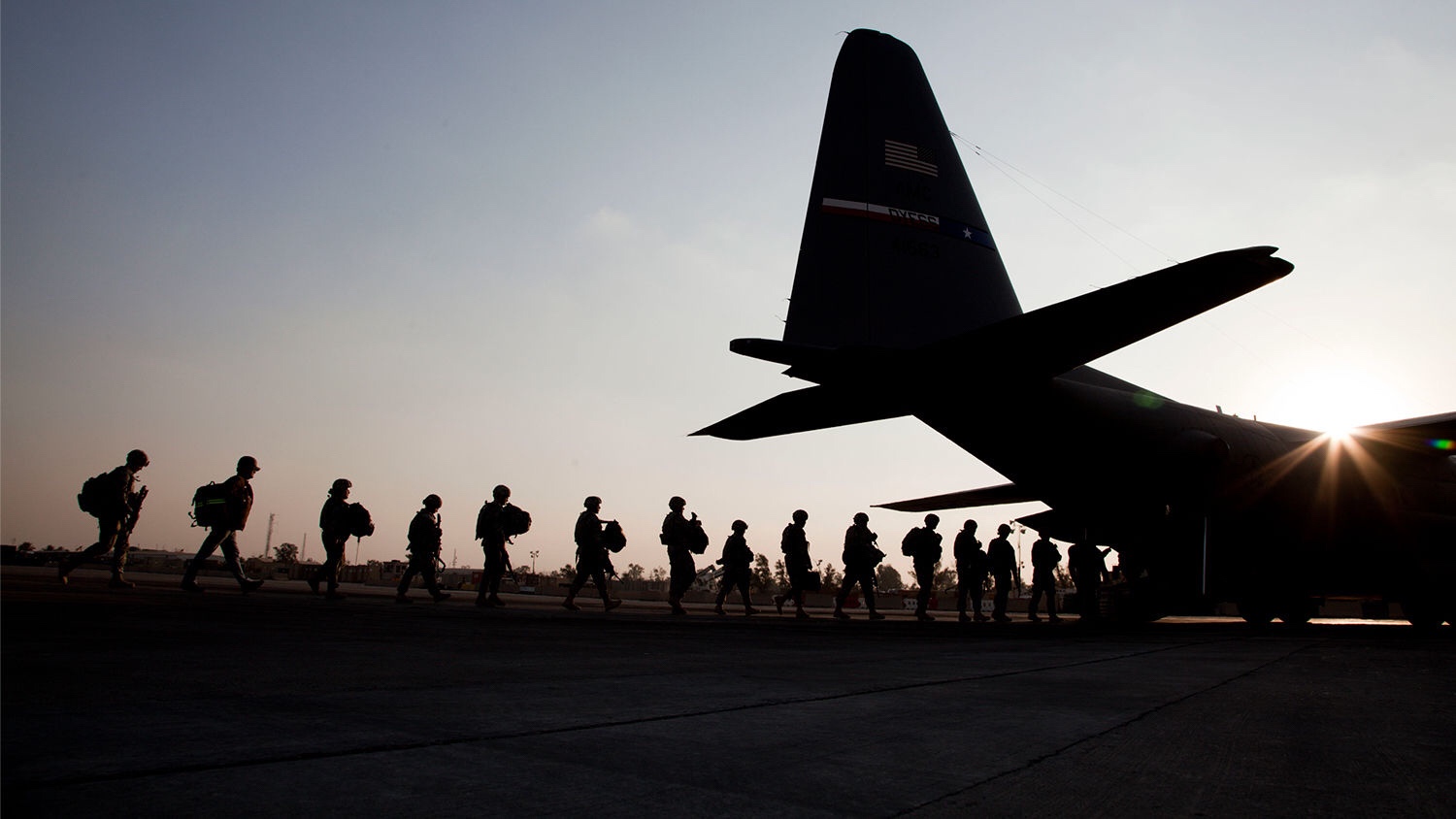American soldiers board an Air Force C130 at Baghdad Airport.
Getty Images
Iran’s prevailing persistence and political subterfuge
By Warren Reinsch • June 15
The United States promised to withdraw its forces from Iraq during a video conference on June 11. The joint statement by the State Department said that the U.S. “reiterated that it does not seek nor request permanent bases or a permanent military presence in Iraq” and that it “would continue reducing its forces from Iraq.” As a result of Iran’s persistence and political subterfuge, its goal of driving the U.S. out of Iraq is about to be fully realized.

NEA Press Office
@NEAPressOffice
Under Secretary of State David Hale leads U.S. delegation during June 11 virtual U.S.-Iraq Strategic Dialogue meeting. The United States and Iraq re-committed to their broad and strategic partnership.


See NEA Press Office’s other Tweets
Despite previous statements by U.S. President Donald Trump, he is now expediting America’s withdrawal. In February 2019 on cbs This Morning, Mr. Trump expressed no desire to leave Iraq. In fact, he said he wanted to keep the Al Asad Air Base in order “to watch Iran.”
Again, in January, when tensions between Iran and the U.S. were at a peak, Mr. Trump said the U.S. military wouldn’t leave Iraq anytime soon, calling a U.S. withdrawal “the worst thing that could happen to Iraq.” Two months later, however, the U.S. began consolidating its troops and handing over its military bases to Iraq. And now, the State Department says it has no desire for a permanent base or military presence in Iraq as it continues to withdraw troops.
Why is the U.S. suddenly leaving Iraq?
Controlling Parliament
Decades of Iranian infiltration have given Iran a spider’s web of diplomatic relations inside the Iraqi government. This has created a highly corrupt government that is largely controlled by and strongly influenced by Iran.
Iraq expert Michael Pregent discussed the outcome of the May 2018 parliamentary elections in an interview on the Debbie Aldrich Show in April. He described how Moqtada al-Sadr, who leads Iraq’s largest militia, won the largest number of seats. Pregent said Sadr “says he is not pro-Iran, but Iran gets to tell him what do to, and he does what they say.”
The Fatah Alliance—which was formed by several U.S.-designated terrorist militias, is pro-Iran, and calls for the ousting of U.S. and all foreign forces—won the second-largest number of seats. A few hours before the U.S.-Iraq dialogue began, the Fatah Alliance issued a statement “reminding the head and members of the Iraqi negotiating delegation of the unanimous parliamentary vote that stressed the need for foreign forces to leave Iraq.” Former Prime Minister Nouri al-Maliki, another leader in Iran’s back pocket, won third place.
These three parties created a coalition that saturates Iraq’s government. This same pro-Iran parliament unanimously voted on January 5 to expel all U.S. and foreign forces from Iraqi territory. Since the U.S. is in Iraq by the mandate of the prime minister, the parliament does not have the authority to banish U.S. forces. Nevertheless, the act was symbolic of the government’s position.
Pro-Iran Prime Minister
When Iraq’s parliament passed the resolution to oust U.S. forces, no prime minister was in office—only a caretaker. That changed on May 7 when Mustafa al-Kadhimi and his cabinet received a vote of confidence from the parliament and was sworn into office. Since his nomination on April 9, Kadhimi has received widespread support from both Iran and the U.S. Claiming to be an independent and having a history with the U.S. made him appear to be a compromise candidate. However, there was a huge giveaway that Kadhimi was Iran’s selection.
A few days before he was nominated, Iranian Quds Force Cmdr. Ismail Qaani made his first visit to Iraq since assuming the role after the January 3 assassination of Qassem Suleimani. Such a public visit is uncommon for Qaani, who prefers to avoid media coverage. Nevertheless, the visit shows how much importance Iran placed on ensuring that its candidate would be nominated. The timing also suggests that Kadhimi could be in Iran’s back pocket.
U.S. forces are in Iraq for two reasons: 1) to defeat the Islamic State; 2) because of the request of Iraq’s prime minister. If the U.S. is suddenly leaving Iraq, logically, it must be leaving because of one or both of these reasons no longer exists.
The U.S. claims it is leaving because it has defeated the Islamic State, but facts suggest otherwise. According to the Financial Times, the Islamic State “staged at least 566 attacks in Iraq in the first three months of the year and 1,669 during 2019, a 13 percent increase from the previous year.” Contrary to being “defeated,” the Islamic State has increased its number of attacks. Islamic State spokesperson Abu Hamzah al-Qurayshi said the jihadists increased attacks “after your [Iraq’s] American masters began withdrawing their forces.”
This rationale for the U.S. withdrawal was likely a political cover. It seems Iran’s persistence is finally paying off and the new prime minister may have told President Trump, Leave Iraq and we’ll take care of the Islamic State.
Iran’s Plan Continues
Mysteriously, on June 1, prominent Shiite militia leader and head of the Fatah Alliance Hadi al-Amiri submitted his letter of resignation, which was approved by Iraq’s parliament. According to Rudaw, “Though it remains unclear as to what prompted Amiri to resign from the parliament, it is rumored that he is vying for the post of head of the pmu [Popular Mobilization Units], known as the Hashd al-Shaabi in Arabic.” Two days later, Iran flew Commander Qaani into Iraq to meet with Prime Minister Kadhimi and pmu leaders—one week before the U.S.-Iraq dialogue.

Elijah J. Magnier
@ejmalrai
Head of #Iran #IRGC-Quds force Esmail Qaani ended his 3 days visit to #Iraq and met with PM Mustafa Khadimi, Hashd al-Shaabi commanders and other Iraqi political leaders. Qaani arrived in #Iraq with a visa, along with an Iranian delegation.

11:45 PM – Jun 5, 2020
The pmu is an Iraqi paramilitary umbrella organization comprised of more than 50 majority Shiite militias, which formed in 2014 to combat the emergence of the Islamic State. The pmu has an estimated 150,000 militiamen. Iraqi Executive Order 91, enacted by former Prime Minister Haider al-Abadi in 2016, made the Iran-backed militias an official state organization as a branch of the Iraqi Security Forces. On July 1, 2019, then Iraqi Prime Minister Adel Abdul-Mahdi issued a decree ordering the Iran-backed militias to fully integrate with the Iraqi Armed Forces. Many of its leading militias openly welcomed the decree. Full integration with the Iraqi military would provide the militias access to American-made weapons and vehicles, as well as an extra layer of protection. Now, striking these designated terrorist militias is seen as an attack on the Iraqi government.
If Amiri, head of the largest Iraqi Shiite militia—Badr Corps—and a U.S.-designated terrorist for his involvement in the siege of the U.S. Embassy in Baghdad in January, were to become head of the pmu, he would control Iraq’s most lethal organization and Iran’s most effective tool for controlling Iraq—the same organization created to fight the Islamic State. On June 13, Amiri made a public statement: “We will not forget Iran’s support for Iraq in the fight against” the Islamic State.
Playing ‘Whack-a-Mole’
After spending an estimated $2 trillion and approximately 4,500 American soldiers’ lives in Iraq, the U.S. has decided to leave Iraq to be dictated by Iran and its proxies. As the U.S. continues its retreat, leaving behind a large power vacuum, Iran will gain even more control.
In our March 2019 issue, Trumpet Jerusalem correspondent Brent Nagtegaal described the effects of the inevitable American withdrawal from the Middle East. In “America Is Back…ing Out,” he wrote: “Every important biblical prophecy that takes place in the Middle East occurs in a power vacuum created by America’s exit. In fact, Bible prophecy indicates that the U.S. will have vacated so entirely from the Middle East that it will not impact it at all.”
One of those critical Bible prophecies is recorded in Daniel 11:40, which states: “And at the time of the end shall the king of the south push at him: and the king of the north shall come against him like a whirlwind, with chariots, and with horsemen, and with many ships; and he shall enter into the countries, and shall overflow and pass over.”
The King of the South
In his booklet The King of the South, Trumpet editor in chief Gerald Flurry identifies this pushy king of the south as the radical Islamic terrorist snake, led by Iran. Historically, Iran, or the Persian Empire, was never great without Mesopotamia, modern-day Iraq. The same is true today. In order for Iran to dominate the region, it must control Iraq.
In The Iranian Time Bomb (2007), Michael Ledeen wrote, “If the Islamic Republic can drive the United States out of Iraq, destroy the fledgling democracy in Lebanon, and damage or destroy Israel, the mullahs believe they can dominate the area …. If they are seen to fail, however, their destiny is uncertain. That is why they are pushing so hard on all fronts, hoping to score their own victories before they fall.”
The Trumpet Network
For more than 20 years, the Trumpet has warned about this biblical king of the south’s rise and how Iraq would fall to Iran. In December 1994—while Saddam Hussein was still in power—Mr. Flurry asked, “Is Iraq About to Fall to Iran?” In the July 1998 Trumpet, he wrote, “The stage is being set for an Islamic group of nations to be led by Iran as the prophesied king of the south …. Iran has a foreign policy with a lot of ‘push.’”
Driving the U.S. out of Iraq is Iran’s first step to domination—that is why it is pushing so hard.
In the January 2018 Trumpet feature article “America’s Greatest Defeat—Iran’s Victory,” Mr. Flurry wrote:
America may have helped drive the Islamic State out of Iraq and Syria—but now America is about to be driven out of Iraq and Syria by Iran! We are about to see a vicious turnaround. In many ways, it has already started.
Written over a year ago, we are now seeing this forecast become reality. Iran’s persistent rocket salvo against U.S. bases and its diplomatic infiltration into Iraqi politics have clinched its control over the nation.
Ever since the U.S. entered Iraq, it has been Iran’s goal to drive it out. This goal is now coming to fruition. As the U.S. continues to withdraw, watch for Iran to rise in power and become more emboldened than ever.
For more information about Iraq’s prophetic fall to Iran, please read Mr. Flurry’s article “America’s Greatest Defeat—Iran’s Victory” and request your free copy of The King of the South.
No comments:
Post a Comment